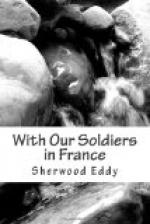2. Brotherliness, or comradeship, shows itself in unselfish service and cooperation with others.
3. Generosity and tender-heartedness show themselves in the men’s willingness to help a comrade, to share their last rations, and to insist that others be attended to on the battlefield before themselves when they lie wounded. These are among the most beautiful virtues which the war has revealed.
4. Straightforwardness and genuine honesty are demanded; and all cant, hypocrisy, double dealing, shirking, and unreality are scathingly condemned.
5. Persistent cheerfulness in the midst of monotony, drudgery, suffering, danger, or death, is admired and maintained by the majority. This is not incompatible with the “grousing” or grumbling which the Englishman regards as his prerogative. This good cheer shows itself in the inveterate singing and whistling of the men on the march.[1]
Commenting upon the virtues of the soldiers, especially the wounded, a hospital nurse writes: “I was struck by the amount of real goodness among the men—their generosity, kindness, chivalry, patience, and self-sacrifice. The sins which they dislike are those sins of the spirit which Christ denounced most bitterly—hypocrisy, pride, meanness. They love giving, they bear pain patiently, they honor true womanhood, they reverence goodness.”
Probably no one in the present war has given a better description of the unconscious virtues of the soldiers than has Donald Hankey, in his chapter on “The Religion of the Inarticulate,” fragments of which we here quote:
“We never got a chance to sit down and think things out. Praying was almost an impossibility. . . . Above all, we were not going to turn religious at the last minute because we were afraid. . . . The soldier, and in this case the soldier means the workingman, does not in the least connect the things that he really believes in with Christianity. . . . Here were men who believed absolutely in the Christian virtues of unselfishness, generosity, charity, and humility, without ever connecting them in their minds with Christ; and at the same time what they did associate with Christianity was just on a par with the formalism and smug self-righteousness which Christ spent His whole life in trying to destroy. . . . The men really had deep-seated beliefs in goodness. . . . They never connected the goodness in which they believed with the God in Whom the chaplains said they ought to believe. . . . They have a dim sort of idea that He is misrepresented by Christianity. . . . If the chaplain wants to be understood and to win their sympathy he must begin by showing them that Christianity is the explanation and the justification and the triumph of all that they do now really believe in. He must start by making their religion articulate in a way which they will recognize.”
As we turn from the virtues to the vices or moral weaknesses of the soldier in war time, we find that they also fall chiefly under five headings:




